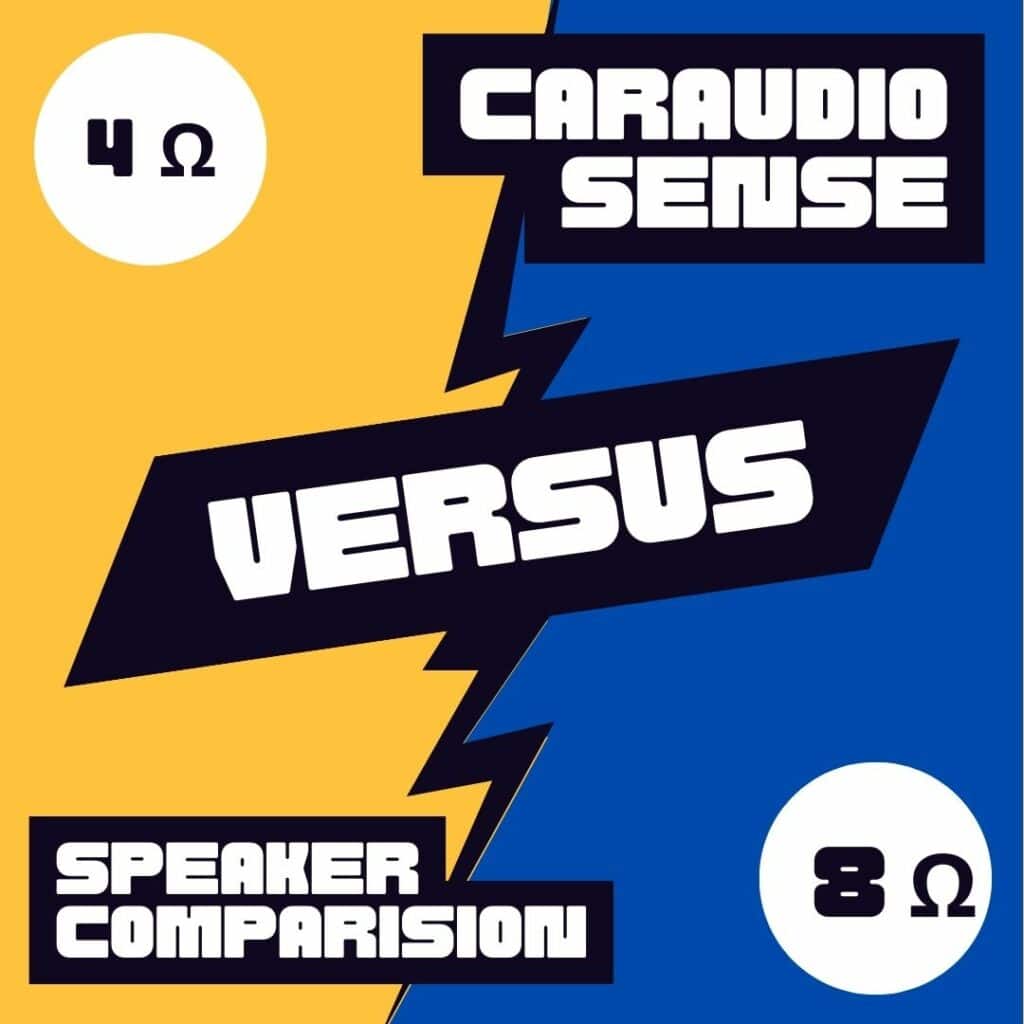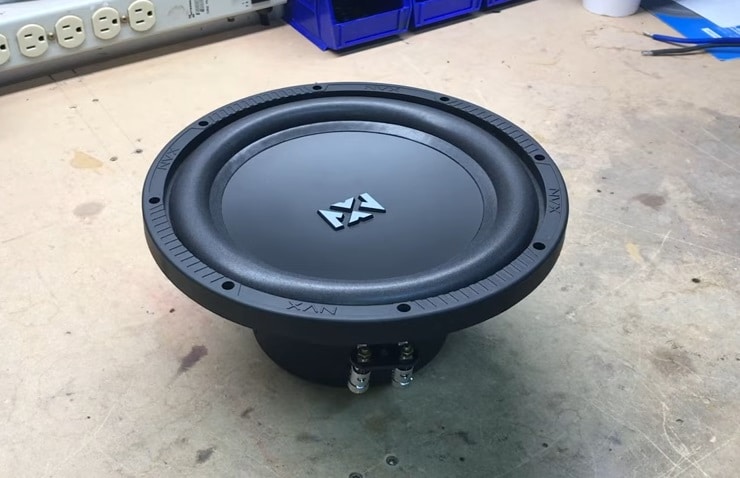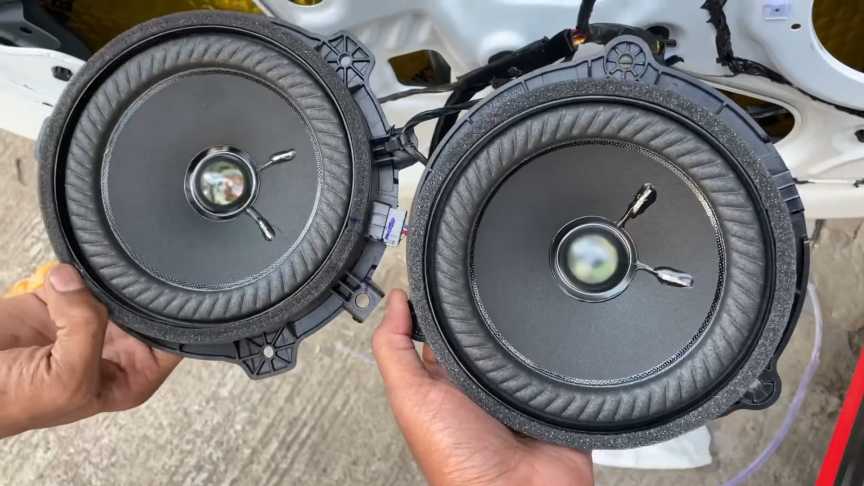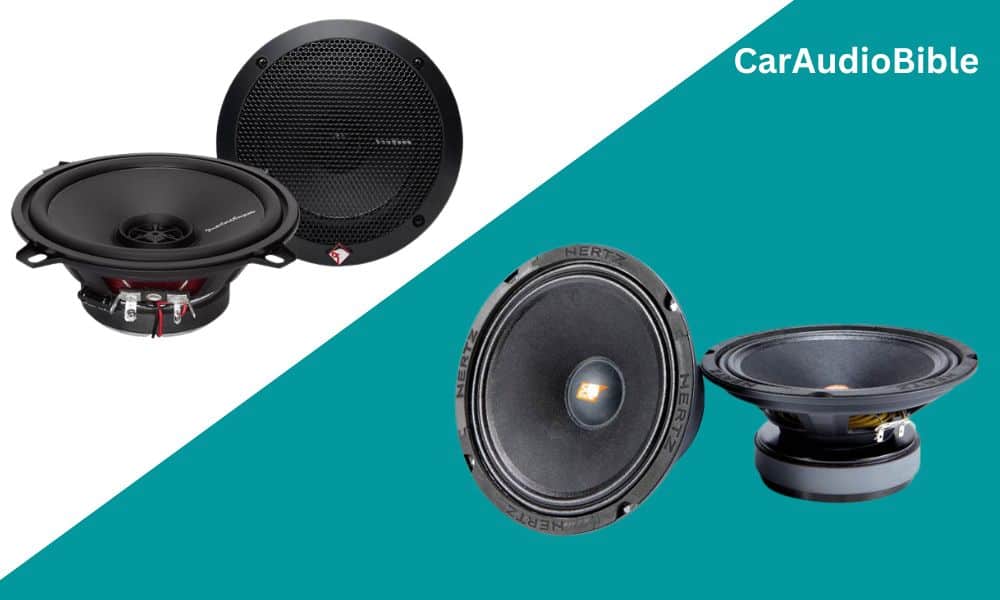Louder or smoother? 4-ohm vs 8-ohm speakers can make a big difference in your sound experience.
Choosing the right one depends on what kind of music you listen to and the power of your amplifier.
Don’t worry, with over 10 years of experience specifically in car audio, I’ve helped many people fine-tune their sound systems to perfection.
I’ll break down the key factors to consider so you can pick the perfect speakers for your car’s setup and achieve the listening experience you crave.

- What is an Ohm, and why does it matter when choosing a speaker?
- Difference between 4-ohm and 8-ohm speakers
- FAQs – 4 Ohm Vs. 8 Ohm Speaker
- What is the ideal ohm rating for bass quality?
- What effect do ohms have on sound quality?
- What happens when the impedance of a speaker is too low?
- 200 watts at 4 ohms is what at 8 ohms?
- 300 watts at 4 ohms is what at 8 ohms?
- Is a 4 ohm speaker better than a 2 ohm?
- Which is better 4 ohm or 6 ohm speakers?
- Does 4 ohm sound better than 1 ohm?
- What is the best ohm for listening to music?
- Are 4 ohm speakers harder to drive?
- Is lower ohm more powerful?
- Can you mix 4 ohm and 8 ohm speakers?
- Are 8-ohm speakers louder?
What is an Ohm, and why does it matter when choosing a speaker?
An ohm (Ω) is a unit that measures an electrical circuit’s resistance to current flow. In speakers, this impedance rating indicates how much power they demand from your amplifier. Unlike the misconception, a lower ohm rating doesn’t automatically translate to better sound.

Here’s why impedance matters:
- Power Delivery and Efficiency: Lower impedance speakers (typically 4 ohms) allow more current to flow, requiring more power from the amplifier to achieve high volumes. This can be advantageous for larger spaces or powerful amplifiers. Conversely, higher impedance speakers (usually 8 ohms) are more efficient, needing less power to play loud. They’re ideal for smaller rooms or receivers with lower wattage ratings.
- Sound Characteristics: Impedance can influence a speaker’s tonal balance. Lower impedance speakers might deliver a fuller, warmer sound at high volumes, while higher impedance speakers may produce a brighter, more detailed sound at lower volumes.
4 Ohm Speaker

If you want a speaker that can produce high-quality sound, you should consider getting a 4-ohm speaker. These speakers are specifically designed to deliver excellent sound quality and are also very durable.
4-ohm speakers are typically made from high-quality materials and use a particular type of voice coil that helps produce a clear and crisp sound. The voice coil is responsible for converting the electrical signal into sound waves, and it is also responsible for amplifying the sound.
4-ohm speakers are usually more expensive than other speakers, but they are worth the investment if you want to experience high-quality sound.
Pros
- 4-ohm speakers are made to produce high-quality sound- The materials used and the voice coil make for a clear and crisp sound.
- They are durable- Since they’re made of high-quality materials, they’ll last longer.
- Though usually pricier than other speaker models, the sound quality you’ll experience is worth the extra cost.
Cons
- They might be more expensive than you’re expecting- But remember, the sound quality is worth the investment.
- You must be careful about the materials you use with 4-ohm speakers. Using the wrong type of material can cause damage to the speaker.
- 4-ohm speakers require more power to run than other speakers, so make sure your amplifier can handle the extra power.
8 Ohm Speaker

An impedance of 8 ohms is the conventional type of speaker utilized in a variety of audio applications.
8-ohm speakers are typically used in home theater, car audio, and PA systems. They are also often used in professional audio applications such as recording studios and live sound venues.
8-ohm speakers are available in various sizes and styles to fit any application. They are also available in multiple price ranges, so you can find a set that fits your budget.
Pros
- The proof is versatile and can be used in various situations and locations.
- Ideal for use in car audio systems and marine applications
- It withstands high volumes without distortion
- Responds to a wide range of frequencies
Cons
- It may not be appropriate for use in home theater systems.
- Not as durable as some of the other options on the market
Related Post – Best 6×9 Speakers for Bass without Amp
Difference between 4-ohm and 8-ohm speakers

- The 4-ohm speakers are typically made from high-quality materials and use a particular type of voice coil that helps produce a clear and crisp sound.
- The voice coil is responsible for converting the electrical signal into sound waves, and it is also responsible for amplifying the sound.
- The 4-ohm speakers are usually more expensive than others, but they are worth the investment if you want to experience high-quality sound.
- The 8-ohm speakers are typically used in home theater, car audio, and PA systems. They are also often used in professional audio applications such as recording studios and live sound venues.
- The 8-ohm speakers are available in various sizes and styles to fit any application. They are also available in multiple price ranges, so you can find a set that fits your budget.
- However, 8-ohm speakers are not suitable for home theater use and are not as long-lasting as other choices available.
4 Ohm Vs. 8 Ohm Speaker – Which one is better for you?
They are available in a number of different sizes and styles to match any need, and they come in a range of price ranges as well.
If you have a high-quality audio setup and you’re looking for the best possible sound quality, then 4-ohm speakers are the way to go. They are made from high-quality materials and use a particular type of voice coil that helps produce a clear and crisp sound. The only downside is that 4-ohm speakers are usually more expensive than others.
If you have a smaller budget or are looking for speakers that can be used in various applications, then 8-ohm speakers may be a better option.
Depending on your needs, you can find a size and style that fits, with options to fit any budget.
8-ohm speakers might not be ideal for home theater use, and they aren’t as tough as some of the other choices available.
In the end, deciding which type of speaker to choose is up to you. Consider your budget and your needs before making a decision. 4-ohm speakers are the best option if you’re looking for the highest quality sound, but 8-ohm speakers may be a better option if you’re working with a smaller budget.
FAQs – 4 Ohm Vs. 8 Ohm Speaker
What is the ideal ohm rating for bass quality?
8 Ohms is a perfectly acceptable impedance for bass speakers. It’s just that, all other things being equal, a lower-impedance speaker will be louder than an 8-ohm speaker.
But that doesn’t mean that 8-ohm speakers are bad; they’re just not as loud as their lower-impedance counterparts. So if you’re looking for the loudest possible bass, go with a lower-impedance speaker. But if you’re looking for a good quality bass sound, 8 ohms is perfectly fine.
What effect do ohms have on sound quality?
It doesn’t have an impact on the sound’s quality, no. The impedance of the speaker is measured in ohms, and it has no impact on sound quality because it determines how difficult electricity can flow through the speaker.
Though a higher impedance makes it more difficult for the current to flow, this doesn’t degrade sound quality. It just means that more power will be needed to drive the speaker. So, if you’re looking for a louder speaker, you should choose one with a higher impedance rating.
What happens when the impedance of a speaker is too low?
As many people have noted, when speaker impedance is too low, there can be increased distortion in the sound. This is because the electrical signal that drives the speaker is not correctly matched to the speaker, so some of the energy from the signal is lost as heat instead of being converted into sound waves.
If the amplifier’s sensitivity is too high, it may be damaged by overloading it. A stronger amplifier or replacing the original speakers with ones with a greater impedance can help you avoid this issue.
In either case, it is essential to ensure that the new speakers are compatible with the existing amplifier; otherwise, more damage could be done to your equipment. With inexperienced users it might be best to seek professional help to avoid further complications.
200 watts at 4 ohms is what at 8 ohms?
At 8 ohms, the equivalent power of 200 watts at 4 ohms is approximately 100 watts. This is because as the resistance (ohms) increases, the power output decreases.
So if you were to use an amplifier that outputs 200 watts at 4 ohms with a speaker that has a resistance of 8 ohms, you would get a power output of approximately 100 watts.
However, it is important to note that this is just an estimate and the actual power output may vary depending on the specific equipment used. So if you want to make sure you are getting the full 200 watts at 4 ohms, it’s best to use a speaker with a resistance of 4 ohms.
300 watts at 4 ohms is what at 8 ohms?
At 8 ohms, the equivalent power of 300 watts at 4 ohms is approximately 150 watts. This follows the same principle as discussed above with the 200 watt example – as resistance increases, power output decreases. So if you are using a speaker with a resistance of 8 ohms and an amplifier that outputs 300 watts at 4 ohms, you can expect a power output of approximately 150 watts.
Is a 4 ohm speaker better than a 2 ohm?
It’s not necessarily about one being “better” than the other, but rather understanding the differences and how it can affect your audio setup. A 4 ohm speaker will typically have a higher power rating compared to a 2 ohm speaker due to its higher resistance, which means it can handle more power from an amplifier without risking damage.
However, a 2 ohm speaker may be more efficient and able to produce louder sound with the same amount of power. It ultimately depends on your personal preferences and the compatibility with your audio equipment.
Additionally, it’s important to note that using a speaker with a lower resistance (such as 2 ohms) can put strain on an amplifier that is not designed to handle such low impedances, potentially leading to overheating and damage. So it’s important to consider the overall compatibility of your audio system when choosing between a 4 ohm or 2 ohm speaker.
Which is better 4 ohm or 6 ohm speakers?
Again, it’s not about one being “better” than the other, but understanding the differences and finding the right fit for your audio setup. A 6 ohm speaker may have a slightly lower power rating compared to a 4 ohm speaker, but it can still provide good sound quality and efficiency when paired with the appropriate amplifier.
Does 4 ohm sound better than 1 ohm?
The resistance level does not necessarily determine the sound quality of a speaker. It’s important to look at other factors such as frequency response, sensitivity, and power handling capabilities.
A 1 ohm speaker may have different characteristics compared to a 4 ohm speaker, but it ultimately depends on the specific model and how well it pairs with your audio equipment. So rather than focusing on the ohm rating, it’s important to choose a speaker with the right features and specifications for your desired sound quality.
Additionally, keep in mind that using speakers with very low impedance levels (such as 1 ohm) can put strain on an amplifier that is not designed to handle such low impedances, potentially leading to overheating and damage.
What is the best ohm for listening to music?
Some people may prefer the sound of 4 ohm speakers while others may prefer 6 ohm or even higher impedance speakers. It’s important to experiment and find what works best for your specific setup and listening preferences.
Additionally, keep in mind that the best ohm for listening to music may also depend on the genre of music you primarily listen to. For example, some speakers may excel at reproducing bass-heavy electronic music while others may be better suited for classical or jazz.
Are 4 ohm speakers harder to drive?
Not necessarily. While 4 ohm speakers may require a bit more power compared to higher impedance speakers, it ultimately depends on the specific model and its sensitivity rating. Some 4 ohm speakers may have high sensitivity ratings, making them easier to drive with lower power output from an amplifier.
On the other hand, some higher impedance speakers may have lower sensitivity ratings, requiring more power to achieve the same volume levels. It’s important to consider both impedance and sensitivity when choosing speakers for your setup.
Is lower ohm more powerful?
Not necessarily. The ohm rating of a speaker reflects its impedance, which is the measure of resistance to electrical current. A lower ohm rating does not necessarily mean that the speaker has more power. Instead, it indicates how much power is required to drive the speaker at a specific volume level.
Can you mix 4 ohm and 8 ohm speakers?
Yes, it is possible to mix 4 ohm and 8 ohm speakers in a sound system. However, there are some considerations to keep in mind. First, make sure that your amplifier is capable of handling the different impedance levels. It’s also important to match the sensitivity ratings of the speakers as closely as possible to ensure balanced sound output.
Additionally, pay attention to speaker placement and volume levels to avoid overworking any one speaker or causing imbalances in sound quality. In general, it’s best to keep all speakers within the same impedance range for optimal performance. So, it is recommended to use either all 4 ohm or all 8 ohm speakers instead of mixing them.
Are 8-ohm speakers louder?
The loudness of a speaker is determined by its sensitivity rating, which measures how efficiently it converts power into sound.
An 8 ohm speaker might have a higher or lower sensitivity rating than a 4 ohm speaker, impacting its overall loudness.
It’s important to compare the sensitivity ratings when choosing speakers for your setup, rather than solely relying on the impedance level.
Furthermore, other factors such as speaker placement and amplifier capabilities also play a significant role in determining loudness.
So, it’s best to test different speakers in your specific listening environment to determine which ones produce the desired volume levels for your needs.
Related Post – Best 6.5″ Speakers without Amp